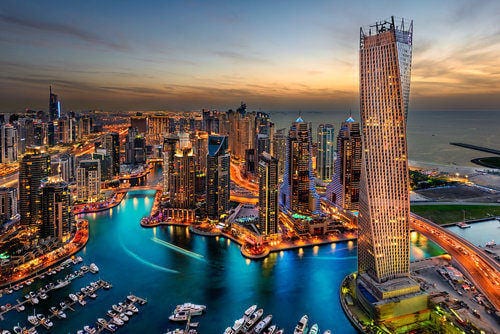
The Emirate kingdom of Dubai has announced a program that will see it generate 25% of its electricity from solar by 2030. Along with an announced 5 GW expansion of the Sheikh Mohammed Bin Rashid Al Maktoum Solar Park, the Dubai government has called for all rooftops to be equipped with solar PV by 2030.
With high electricity demand in the form of air conditioning load and power hungry desalination facilities coupled with abundant solar resource and high levels of deployable finance, the Gulf States have long been thought ideal for high levels of solar PV deployment. Unfortunately concrete schemes have largely not been forthcoming with governments in the region plotting a conservative course when it comes to renewable deployment.
This looks set to change, with the Dubai Clean Energy 2050 strategy being announced late last week. The strategy has set a goal of sourcing 25% of Dubai’s electricity needs from solar PV by 2030, increasing to 75% by 2050. The Middle East Solar Energy Association (MESIA) estimates the program will stimulate US$13.6 billion in new solar investment in that period, and 1.5 GW of rooftop PV by 2030.
To achieve the ambitious goals, Dubai’s government will look to expand its Sheikh Mohammed Bin Rashid Al Maktoum Solar Park to 5 GW, likely making it the world’s largest utility scale PV installation on completion.
Dubai’s rooftop solar program looks particularly ambitious. The government will establish the $27 billion Dubai Green Fund, to provide low-cost finance for rooftop PV. MESIA estimates that there are some 115,000 buildings in Dubai and if all are to be equipped PV it could total a capacity of some 1.5 GW of PV capacity.
Dubai will also seek to encourage solar companies and research projects to set up shop in the kingdom, with the launch of the Dubai Green Zone (DGZ). MESIA says that the DGZ will provide a base for solar companies in the region, with an accompanying Innovation Center looking to house solar technology research, 3D printing and solar desalination projects.An additional $150 million will be provided for smart grid, energy efficiency and solar generation research projects.
“MESIA expects Dubai to become the city with lowest carbon footprint in the world once these measures are fully deployed,” the industry association concludes.
“Every investment in the development of clean energy sources is at the same time an investment to protect the environment for future generation,” said Shaikh Mohammad, in reporting from the Gulf Times. “It is an effort to build our sustainable economic sectors which do not depend on non-renewable energy resources and are unaffected by volatile energy prices. Through this strategy, which is based on innovation, research and development, we aim to explore the future of the energy sector to unveil initiatives that will make use of the scientific and technological developments in this sector and take the lead in their development and application.”
The construction schedule for the Mohammad Bin Rashid Al Maktoum Solar Park will see the second 800 MW phase constructed by April 2017, the 1 GW third phase by 2020, while the fourth phase, bringing the total capacity to 5 GW, will begin operations in 2030. The project has already broken records for low bids, although some analysts have noted that this price should not be a yardstick for future development in the region.
Source: PV Magazine. Reproduced with permission.










